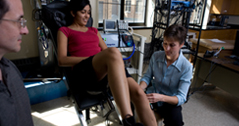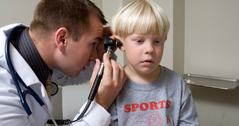Mission
The Department of Physician Assistant Studies combines Marquette's Jesuit tradition of cura personalis ("care for the whole person") with the College of Health Sciences' Jesuit ideals of concern for the spiritual, emotional and physical development of the individual.
We're dedicated to educating physician assistants for supervised practice of primary medicine in dynamic health care systems. We realize our mission through a synergistic strategy of educational goals.
Educational Goals
These goals prepare each student intellectually, socially, affectively and spiritually:
- Thoroughly interview and examine patients, order appropriate tests, assess findings and collaborate with the supervising physician and, whenever possible, the patient to determine the appropriate treatment plan.
- Be effective communicators, listeners, observers and diagnosticians.
- Instill the importance of counseling, educating and motivating patients and their significant others to take responsibility for their physical, mental and spiritual health.
- Foster optimal PA and supervising physician relationships.
- Identify true emergencies and respond appropriately.
- Be responsive and committed members of the health care team and adhere to the team concept of health care delivery.
- Develop a commitment to lifelong learning.
- Demonstrate allegiance to the profession through participation in professional organizations.
- Contribute to the education of future PA students by participating in physician assistant training.
Learning Outcomes
Graduates of the Physician Assistant program will be able to:
- Perform an appropriate history and physical exam on individuals that concludes with a working diagnosis and initial treatment plan.
- Apply the evidence-based principles of medicine to accurately diagnose and manage acute and chronic disease states and/or medical emergencies.
- Function effectively as a member of the health care team in respect to interpersonal relations, team skills and written and oral communications.
- Demonstrate a commitment to life-long learning by participation in professional development activities on a continuing basis.
- Demonstrate cultural understanding and sensitivity in interactions with patients of diverse socioeconomic, ethnic, and alternative backgrounds.
- Synthesize the medical literature on a given topic and present both an oral and written review.
Undergraduate Admission Requirements
Students apply for admittance into the Physician Assistant Studies program in the fall term of their sophomore year. They are required to complete the two-year, pre-professional phase of the Physician Assistant Studies program and be enrolled in the College of Health Sciences to ensure that they have completed the appropriate prerequisite courses that will make them eligible for a degree in biomedical sciences at the end of the fourth year. Following acceptance into the program, students follow the curriculum as outlined for the three-year Professional phase (see BISC/pre-PA curriculum in Biomedical Sciences Department).
The intensity of the program and the skills necessary for practice as a physician assistant require the program to seek applicants with an excellent academic background, along with strong interpersonal skills and maturity. Prior health care experience is also an indicator of a career commitment to clinical practice. The program’s admission process will consider each applicant’s strengths and select for competitive candidates best qualified to meet the program’s mission.
Selection factors considered in the admission process include the following:
- Cumulative GPA of 3.000 or greater.
- Motivation, maturity, ability to work with people and suitability for clinical practice.
- Minimum of two hundred patient contact hours in health care.
- Knowledge of the PA profession and the profession’s role in the health care system.
- Graduate Record Exam scores for applicants with a degree; SAT or ACT scores for applicants entering the program without a completed bachelor’s degree.
- Three letters of recommendation.
- Personal interviews.
Academic Regulations
Academic Progress
To achieve satisfactory academic progress leading to promotion in the Physician Assistant Program, the student must achieve a GPA of 2.80 in each term (summer, fall, spring). In addition, the student may receive no single grade in any course less than a C. The PA program considers a grade below C to represent unsatisfactory academic progress. Unsatisfactory academic progress may result in conditional promotion, withdrawal, or dismissal.
In the clinical portion of the program, the semester GPA is compiled from an aggregate of clinical rotation grades completed in that semester (summer, fall, spring).
Students may not participate in Physician Assistant preceptorships until they have successfully completed all the required courses in the didactic professional curriculum.
At intervals during each semester and at its conclusion, the Progress and Promotion Committee will review the progress of each student. The committee determines whether the student shall be unconditionally promoted; promoted with recognition; promoted with conditions (as described below); or be subject to other action as described earlier.
Counseling
Directing a student to seek appropriate counseling is within the purview of the P&P Committee. While it is advisable for students to seek assistance from instructors and faculty as a course proceeds, there may be circumstances where support is needed to understand certain concepts and to make up work lost for extraordinary reasons such as illness. The P&P Committee can recommend the student establish a collaborative plan with the faculty to complete selected course objectives and incomplete work. Students will be notified of this recommendation by letter from the program director. This letter will remain a part of the student’s permanent file. In specific situations involving financial or personal elements, the committee may recommend outside resources be utilized to satisfy this category of promotion. When medical or psychiatric consultation is required or recommended, the P&P Committee will respect patient/provider confidentiality. However, documentation of enrollment and/or completion may be required by the committee.
Dismissal
A student may be dismissed for reasons including the following:
- One or more failures in any one term.
- Two (2) successive or three (3) aggregate terms on probation.
- Unprofessional conduct or unethical behavior.
- Failure to meet the conditions of a P&P Committee decision or terms of a collaborative remediation agreement.
Temporary Withdrawal from Program
Students who find it necessary to request a temporary withdrawal from their program must submit a written request to the program director.
The P&P Committee may recommend, and must approve, the temporary withdrawal. The temporary withdrawal may be indicated under circumstances unique to specific problems of a given student, however, the temporary withdrawal shall extend no longer than a single calendar year.
Normally, a student will be readmitted to the program at the end of his/her leave if the P&P Committee, believes the purpose of the temporary withdrawal has been successfully achieved. The committee may require the student to repeat course work before reentry after a prolonged absence.
The professional phase of the PA program must be completed in no more than 4 years. Therefore, if a second temporary withdrawal is requested, the student may be dismissed from the program or required to reapply to the program.
Medical Withdrawal
Purpose
An official medical withdrawal may be needed when, in extraordinary cases, a student’s physical and/or psychological condition interferes with that student’s ability to participate in campus life, including the ability to complete or make satisfactory progress toward academic goals. Upon request, an official medical withdrawal may be granted, or in some cases, required by the university, as referenced in the Student Handbook, or other university, college or school policies. Note: a student may withdraw from a term for various reasons, including medical; however, if the student wishes to be verified by the university as having withdrawn with an official medical withdrawal, this policy and the processes outlined below then applies.
Process
A student who chooses to withdraw and requires documentation of the withdrawal for health insurance or other purposes, must complete the appropriate Medical Withdrawal form found here: mu.edu/mucentral/registrar/policy_forms.shtml. This form must be submitted before or within the term of illness/injury and by the deadline to withdraw from the session/term, as published in the University Academic Calendars (mu.edu/mucentral/registrar/cal_index.shtml). If the student is unable to participate in the medical withdrawal process and an official medical withdrawal is needed, the student’s college/school office, parent, spouse, partner, or other designee may do so on behalf of the student, once the incapacitation of the student is documented or power of attorney is provided. The Office of Student Affairs may, at times, require a student’s medical withdrawal on an involuntary basis. In this case, that office will process the Medical Withdrawal form on behalf of the student. In either case, voluntary or involuntary withdrawal, the university will not grant retroactive official medical withdrawals of any kind for previous terms/sessions. In addition, all previously graded courses at the time of the request will remain on the student’s record, regardless of the term/session in which the courses were taken.
A student who withdraws, or is withdrawn, for medical reasons prior to the end of late registration will have no courses reflected on the academic record for the term of the withdrawal. A student who withdraws, or is withdrawn, for medical reasons after the end of late registration will receive final grades of ‘W’ in all courses for the term of the withdrawal, except when courses have already been graded, or when grades of ‘ADW’ (administrative withdrawal) are warranted.
The completed ‘Medical Withdrawal Request’ form is to be submitted in person to Marquette Central or mailed to the Office of the Registrar by the student, the student’s designee, the student’s college/school office, or the Office of Student Affairs, and must include all relevant documentation as described on the form. The form and all documentation will be confidentially forwarded to the Medical Withdrawal Committee (MWC) for action.
The Medical Withdrawal Committee is comprised of four to five members. Permanent members include representatives from the Counseling Center, the Office of Student Financial Aid and the Office of the Registrar. Additional representatives will be included as follows: a designated representative from the Committee on Academic Procedures (for undergraduate student requests); a designated representative from the Graduate School (for graduate student requests); a designated representative from the Graduate School of Management (for GSM student requests); designated representative from the College of Health Sciences (for Health Sciences Professional or pre-professional student requests). The Medical Withdrawal Committee reserves the right to consult with individuals from the student’s college/school office, Counseling Center and/or Student Health Services on a case-by-case basis. The Medical Withdrawal Committee will carefully review each request for medical withdrawal and determine the action to be taken, including any refund, if appropriate. A medical withdrawal determination will result in a registration hold placed on the student’s record.
A student has the right to appeal the Medical Withdrawal Committee’s determination by writing to the Office of Student Affairs within five business days of the Committee’s decision. The refund decision, if any, may not be appealed on its own, but will be considered as part of an appeal of the withdrawal decision. The Office of Student Affairs will, in turn, consult with the student’s college/school office, or other university offices if appropriate, and reply to the student within five business days. The determination of the Office of Student Affairs is final.
Once a final determination has been made, the form will be signed by the chair of the committee and forwarded to the Office of the Registrar. The Office of the Registrar will then notify the student’s college/school office and other offices, as appropriate; process the withdrawal; add the registration hold; and apply any refund, if granted. The original signed form will be retained by the Office of the Registrar as part of the permanent academic record.
Because a medical withdrawal can affect so many aspects of academic progress at Marquette, the student is encouraged to first consider other options that might enable the student to remain enrolled. Before requesting a medical withdrawal, a discussion with the student’s college/school office, the Office of Student Financial Aid (if applicable), the Office of International Education (if applicable) and other offices, as appropriate, is highly encouraged (e.g., Veterans, ROTC). It is also recommended that each student discuss the ramifications of a withdrawal with his/her health insurance or other service providers.
Readmission after Medical Withdrawal: Immediate Subsequent Term
- A student who withdraws prior to the end of registration, such that no courses appear on the academic record for the term of withdrawal, must apply for readmission to the university in order to attend any subsequent term.
- A student who withdraws after the end of late registration and has already earned grades, or receives grades of ‘W’ and/or ‘ADW’ in the term of withdrawal, is not required to apply for readmission to the university for the immediate subsequent term.
Approval to return to the university following a medical withdrawal is not guaranteed. The review process will follow all of the regulations outlined in the university readmission policy, in addition to any additional requirements imposed at the time of the medical withdrawal. The Medical Withdrawal Committee must approve a student’s return to the university and the student’s college/school must subsequently approve readmission to the college/school (if applicable). The registration hold imposed at the time of the medical withdrawal will not be removed from the record until the student is readmitted by the college/school (as applicable) and/or approved to return to the university by the Medical Withdrawal Committee.
Because of the documentation required, and the various decisions that must be made by university officials, it is necessary that the process to return, as outlined above, begin well in advance of the term/session in which the student wishes to re-enroll. At a minimum, the completed readmission application (if applicable), the ‘Request to Return After a Medical Withdrawal’ form and all required documentation must be submitted no later than two weeks prior to the start of the session/term in which the student desires to return to the university. Failure to meet the two-week deadline may result in deferment of readmission to the following term/session.
Readmission after Medical Withdrawal: Future Terms
- A student who withdraws prior to the end of registration, such that no courses appear on the academic record for the term of withdrawal, must apply for readmission to the university in order to attend any subsequent term.
- A student who withdraws after the end of late registration, has already earned grades or receives grades of ‘W’ and/or ‘ADW’ in the term of withdrawal and who does not enroll in the immediate subsequent term, must apply for readmission to the university.
Approval to return to the university following a medical withdrawal is not guaranteed. The review process will follow all of the regulations outlined in the university readmission policy, in addition to any additional requirements imposed at the time of the medical withdrawal. The Medical Withdrawal Committee must approve a student’s return to the university and the student’s college/school must subsequently approve readmission to the college/school. The registration hold imposed at the time of the medical withdrawal will not be removed from the record until the student is readmitted by the college/school, and/or approved to return to the university by the Medical Withdrawal Committee.
Because of the documentation required, and the various decisions that must be made by university officials, it is necessary that the process to return, as outlined above, begin well in advance of the term/session in which the student wishes to re-enroll. At a minimum, the completed readmission application, the ‘Request to Return After a Medical Withdrawal’ form and all required documentation must be submitted no later than two weeks prior to the start of the session/term in which the student desires to return to the university. Failure to meet the two-week deadline may result in deferment of the readmission decision to the following term/session.
Probation
The purpose of placing a student on probation is to formally notify the student that he/she has a serious academic problem which may lead to dismissal from the program. The student is informed of probation status by letter from the program director; this letter becomes part of the student’s permanent file.
Probation may be invoked by the P&P Committee for unsatisfactory academic progress student who fails to maintain a term average GPA to the required level (2.80) maybe subject to dismissal for poor scholarship.
The P&P Committee will require a student placed on probation to establish a collaborative plan with the faculty for definitive improvement in the quality of academic work. This may include enrollment in particular courses; repetition of selected courses; meeting a specific quality point average in the following term; or other specific requirements or conditions. The progress of a student on probation is reviewed during and at the end of the semester of probation. At this time the committee reviews the student’s progress and the student may be taken off of probation, placed on probation again or dismissed.
A student may be placed on probation and promoted. A student receiving a single deficiency may be placed on probation. A student on academic probation will not be endorsed for clinical rotations or graduation until the conditions of the probation are met. A student who is on two successive or three aggregate terms of academic probation may be dismissed.
A student may be placed on professional probation at any time as detailed in the policies regarding professional decorum and ethical behavior.
Re-entry Policy
Students who find it necessary to withdraw from the professional program may reenter at that level only with concurrence of the P&P Committee and the program director and on a space-available and case-by-case basis.
Repeated Courses
Undergraduate students who repeat a course, may do so under certain conditions:
- Normally, the repeated course is taken at Marquette.
- The repeated course is identical to the original course in subject, catalog number, title, subtitle and credits.
- The repeated course is graded with the same grading options as the original, i.e., students may not exercise the CR/NC option for a repeated course.
- Courses that are failed may be repeated until a passing grade is earned.
- A passing grade is determined by the grade that is required in order to receive credit for the course, or to fulfill the program requirements of a degree/major/minor/certificate, as published in the academic program requirements of the university/college/school/department.
- Courses in which a passing grade is earned may be repeated only once.
- These courses allow unlimited repeats: colloquiums, continuation placeholder, co-ops, independent study/research, internships, practicums/clinicals/field work experience, seminar/reading, studio/workshops, study abroad and variable title courses (e.g., topics).
Credit hours earned in a repeated course are only awarded once; however, all previous courses and grades remain on the student’s permanent academic record. Beginning Fall 1999, the grade in the original course is excluded from the cumulative grade point average calculation. The cumulative grade point average is adjusted at the time the repeated course is graded. If a student audits or withdraws from the repeated course, the earlier grade will remain in the cumulative grade point average. If a student repeats a course that was transferred to Marquette, only the Marquette course/grade will be reflected in the total credits earned.
At the time of registration, the repeat process is automated for the first repeat of any course that is not an unlimited repeat course. Should a student need to repeat a course more than once, a request to repeat must be filed using the Request Permission to Repeat a Course form. This request will only be approved if the student has not earned a passing grade in the course, or the university and/or program requirements state that a certain grade must be earned in that specific course and the student has not previously earned the required minimum grade.
Warning Letter
A warning is a written letter to a student for non-acceptable academic progress during the semester (usually at mid-semester). A warning may come from the course instructor or the program director on behalf of the course instructor and its purpose is to make the student aware of impending academic jeopardy. Warnings are reported to the Progress and Promotion Committee and program director for informational purposes.
Withdrawal
The intention of this option, to be used in situations when the P&P Committee judges that the student deserves special consideration even though dismissal is in order, is to provide the student with a less onerous notation in the student’s record than a dismissal. This option applies only to situations of dismissal for academic reasons, and does not apply to situations of dismissal for professional misconduct. Note: Certain time constraints, outlined in the schedule of classes published by the university apply to students requesting a withdrawal on their transcript.
Tuition/Financial Aid for Professional Phase
Students enrolled in the Physician Assistant Studies program upon completion of their baccalaureate degree will be moved into the professional division of Health Sciences and will no longer be eligible for undergraduate financial aid.
Curricula information
Typical Three-Year Professional Phase - Master's of Physician Assistant Studies
| First Year | |||||
|---|---|---|---|---|---|
| First Term | Hours | Second Term | Hours | Summer Term | Hours |
| BISC 3110 | 3 | BISC 4145 | 4 | PHAS 7050 | 4 |
| BISC 3213 | 4 | BISC 3150 | 3 | PHAS 7080 | 2 |
| BISC 3340 | BISC 4165 | 1 | PHAS 7090 | 3 | |
| BISC 4130 | 5 | BISC 7410 | 4 | PHAS 7245 | 2 |
| PHAS 7040 | 1 | PHTH 7558 | 4 | PHAS 7270 | 4 |
| PHIL 4336 | 1 | PHAS 7117 | 3 | ||
| 14 | 19 | 15 | |||
| Second Year | |||||
| First Term | Hours | Second Term | Hours | Summer Term | Hours |
| BISC 7120 | 4 | PHAS 7111 | 4 | PHAS 7997 Capstone | 0 |
| PHAS 7110 | 6 | PHAS 7116 | 1 | PHAS 7986 Internships | 8 |
| PHAS 7115 | 4 | PHAS 7220 | 3 | ||
| PHAS 7200 | 2 | PHAS 7230 | 2 | ||
| PHAS 7255 | 2 | PHAS 7235 | 4 | ||
| PHAS 7265 | 1 | PHAS 7250 | 4 | ||
| PHAS 7260 | 3 | ||||
| 19 | 21 | 8 | |||
| Third Year | |||||
| First Term | Hours | Second Term | Hours | ||
| PHAS 7997 Capstone | 0 | PHAS 7997 Capstone | 7 | ||
| PHAS 7986 Internships | 12 | PHAS 7986 Internships | 12 | ||
| 12 | 19 | ||||
| Total credit hours: 127 | |||||
A Master’s degree in Physician Assistant Studies requires successful completion of minimum total credits of 129. This includes 32 credits of Clinical Clerkship experiences, in addition to a 7 credit Master’s Capstone Project. Required Clinical Clerkship experiences include family practice, internal medicine, emergency medicine, general surgery, pediatrics, women's health, behavioral medicine and electives. PHAS 7986 Internship in Physician Assistant Studies: may be offered for letter grade or S/U grading, as determined by the program.
On this page
- Mission
- Educational Goals
- Learning Outcomes
- Undergraduate Admission Requirements
- Academic Regulations
- Academic Progress
- Counseling
- Dismissal
- Temporary Withdrawal from Program
- Medical Withdrawal
- Probation
- Re-entry Policy
- Repeated Courses
- Warning Letter
- Withdrawal
- Tuition/Financial Aid for Professional Phase
- Curricula information
- Courses




 Warning:
Warning:








